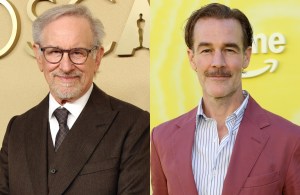A pair of studies on coronavirus may help clue scientists in to developing a vaccine. The studies involved injecting the virus into monkeys, and of those that recovered, they seem to have developed an immunity to the disease.
The studies were published on Wednesday, according to Reuters, which confirmed the assumption that the antibodies the body produces in response to coronavirus are protective. Dr. Dan Barouch, a researcher at the Center for Virology and Vaccine Research at Harvard’s Beth Israel Deaconness Medical Center in Boston said the studies showed that the animals did “develop natural immunity that protects against re-exposure.” He added that the findings were “very good news.”
Videos by PopCulture.com
In the second study, Barouch and colleagues tested 25 monkeys with six prototype vaccines to see if antibodies produced in response were protective. The monkeys were then exposed to COVID-19, along with 10 control animals. All 10 of the control animals showed evidence of infection. However, in the vaccinated animals, Barouch said they “saw a substantial degree of protection.” In fact, eight of the animals were completely protected.
While the studies have been peer-reviewed, they don’t necessarily prove that humans can develop immunity. Even if they can, it’s not clear how long that immunity would last. Nonetheless, Barouch called the findings “a welcome scientific advance.”
Earlier in May, Pfizer began testing coronavirus vaccines in people. In a press release, Pfizer CEO Albert Bourla that the company’s aim is “to bring a safe and efficacious vaccine to the patients who need it most.” He also touted the four-month window of time that’s forced the drug manufacturer “to move from pre-clinical studies to human testing is extraordinary and further demonstrates our commitment to dedicating our best-in-class resources, from the lab to manufacturing and beyond, in the battle against COVID-19.”
On May 12, Dr. Anthony Fauci testified to the Senate, and stated that there were currently eight different vaccines in development from multiple sources, which he said was like “multiple shots on goal.” He declared the development to be important, “because this will be good for global availability if we have more than one successful candidate.” He added he hopes that he will know by late fall or early winter if these trials were successful.
Similarly, former Microsoft CEO Bill Gates is currently in the process of developing multiple vaccines, utilizing the same “multiple shots” technique Fauci referenced. Through his foundation, Gates is reportedly spending billions in developing seven different possible vaccines.
Most Viewed
-

Beverly Hills, CA – January 31, 2026: Jelly Roll, left, and Bunnie Xo, right, pose for portraits on the red carpet during the 68th GRAMMY Awards Pre-GRAMMY Gala & GRAMMY Salute to Industry Icons Honoring Avery Lipman & Monte Lipman at the Beverly Hilton on Saturday, Jan. 31, 2026 in Beverly Hills, CA. Clive Davis’ annual pre-Grammy party hosts an array of A-listers from entertainment, sports, and politics to come together and enjoy performances. (Kayla Bartkowski/ Los Angeles Times)







